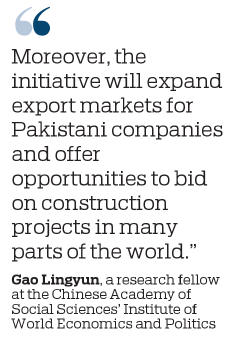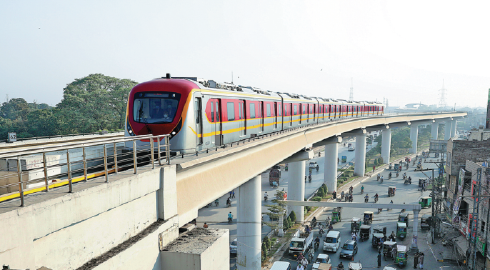Enhanced friendship benefits both nations

Countries celebrate 70 years of diplomatic relations, cooperation
The future economic and trade ties between China and Pakistan will be decided by stable political relations, the tangible growth of the Belt and Road Initiative and complementary goods trade structure especially in manufacturing and healthcare sectors, said government officials and business leaders.
As this year marks the 70th anniversary of the establishment of diplomatic relations between the two neighbors, deepening and diversifying bilateral business cooperation and trade channels are a natural option for both to boost their growing strength, said Chen Jianan, vice-chairman of the Beijing-based China Council for the Promotion of International Trade.
Benefiting from closer business ties, the easing of the pandemic and increased vaccinations, China-Pakistan trade soared by 29.7 percent year-on-year to 36.42 billion yuan ($5.67 billion) in the first quarter of this year, data from the General Administration of Customs showed.
China exports mainly raw materials, computers, telecommunication equipment, trucks, chemical goods, medical equipment, plastic and rubber products, textiles and household appliances to Pakistan. In addition to agricultural products, Pakistan's shipments to China include minerals, cement, sugar, textiles, optical and medical equipment and accessories.
As the protocol of the second phase of the China-Pakistan Free Trade Agreement has come into effect, trade liberalization between the two countries has been greatly improved, and China stands ready to deepen economic and trade cooperation with Pakistan, said Nong Rong, Chinese ambassador to Pakistan.
The diplomat said China will provide "greater convenience for Pakistan's exports to China, strive to narrow the trade deficit, and seek balanced development of bilateral trade". Eager to upgrade their cooperative content in the business field, the two countries reached a free trade agreement in November 2006, and they signed the Agreement on Trade in Service of the China-Pakistan FTA in 2009.
During China's fight against the COVID-19 pandemic at the beginning of 2020, Pakistan immediately donated medical materials to China, and all walks of life in the country voiced their support for China and opposed politicizing the pandemic and stigmatizing China, according to information released by Ministry of Foreign Affairs.
When COVID-19 cases surged in Pakistan, groups of Chinese medical experts as well as batches of medical supplies were sent to assist the country.
The China-Pakistan Economic Corridor is proceeding uninterruptedly, with no jobs cut and no staff withdrawn, which has helped stabilize Pakistan's economy and promoted people's livelihoods, the ministry said.
In order to support Pakistan's fight against the second wave of the pandemic, the Chinese government and the Chinese military each donated 500,000 vaccine doses to Pakistan. Pakistan was the first country to receive COVID-19 vaccines donations from both the Chinese government and military.
Bai Ming, deputy director of international market research at Beijing-based Chinese Academy of International Trade and Economic Cooperation, said since both economies have deployed a large amount of resources in regional connectivity, manufacturing and modern agriculture and China and Pakistan are strong supporters of the multilateral trade system and investment growth.
"They have been defending external openness as a tool for progress, job creation and global economic recovery since 2008," he added.
Since the CPEC was launched, China has been Pakistan's largest trading partner for six consecutive years and its largest source of investment for seven consecutive years.
The CPEC has brought $25.4 billion in direct investment to Pakistan and created 75,000 jobs for the country at its peak.
It is a demonstration of high-quality development under the framework of the Belt and Road Initiative, data from the Ministry of Commerce showed.
Wei Xiaoquan, a researcher specializing in regional economic development at the University of International Business and Economics in Beijing, said that people-to-people exchanges between the two countries are booming this year, cooperation on multilateralism remains close and the friendship has emerged even stronger in the wake of the pandemic.
Thanks to the fast development of the CPEC, a total of 70 early-harvest projects have been identified, among which 46 have been launched or completed by the end of March. Apart from growing trade activities between China and Pakistan, Zhou Yong, vice-president of China State Construction Engineering Corp, said the Belt and Road Initiative has not only injected growth momentum into Pakistan's economy, but also improved people's living standards.
After seven years of growth, the executive said that the initiative has built a solid platform for companies from various countries to carry out cooperation and made more people have a better understanding of mechanism development and infrastructure connectivity.
CSCEC, a large State-owned enterprise, handed the Sukkur-Multan Motorway-the largest transportation infrastructure project under the CPEC-over to the Pakistani side in December last year, highlighting the construction giant's efforts to boost regional cooperation amid the COVID-19 pandemic.
Zamir Ahmed Awan, a senior fellow with the Center for China and Globalization and a Sinologist at the National University of Sciences and Technology in Pakistan, said it wasn't easy to build such a big-ticket project.
"In fact, many were surprised when it was finally completed, as, at one time, even the world's largest companies had refused to take on the project," he said.
"A European construction company reportedly declared the construction next to impossible after an aerial survey. Given the harsh weather, heavy snowfall, and landslides, this road's construction was a miracle made possible by Pakistan and China." The 392-kilometer-long motorway, also known as the M5 motorway in Pakistan, is part of the country's Peshawar-Karachi Motorway and was designed for speeds of up to 120 km/hour with a total investment of about $2.89 billion.
"The motorway has significantly improved traffic conditions and helped to drive economic development in central Pakistan," said Xiao Hua, general manager of the project. "More than 29,000 jobs were created for the locals in the peak time of construction and the operation of the motorway will be all done by the Pakistani side after the completion of all the road building works," Xiao said.
The main body of the project aside, the Chinese constructor also built schools, roads, bridges, wells and water channels for the locals to make their lives more convenient.
Kong Lingxin, an analyst with China International Capital, said Pakistan will remain a destination with growing attraction for Chinese companies because of the opportunities it offers as a convenient marketplace to the Middle East and Africa, as well as a developing platform for many countries and regions to boost the growth of the Belt and Road Initiative.
Many Chinese companies have already invested in Pakistan, including equipment maker China Machinery Engineering, automaker Anhui Jianghuai Automobile Group, infrastructure companies China Railway Group and China Communications Construction, and telecom equipment provider Huawei Technologies.
For Pakistani companies, the initiative also offers a lucrative economic opportunity. Pakistan has been an enthusiastic supporter of the initiative since its initial participation. The country aims to act as a regional trading hub between partner countries and regions committed to the initiative, he said.
"Moreover, the initiative will expand export markets for Pakistani companies and offer opportunities to bid on construction projects in many parts of the world," said Gao Lingyun, a research fellow at the Chinese Academy of Social Sciences' Institute of World Economics and Politics. To facilitate these efforts, State Bank of Pakistan, the country's central bank, allowed Chinese currency renminbi to be used for bilateral trade and investment activities in 2018, a move which could replace the US dollar for transactions in businesses related to the development of the CPEC.



















